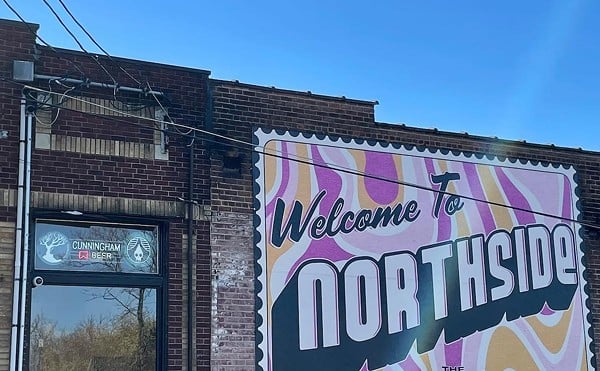|
If you don't have anything nice to say, don't say it on the record. Scott Levesque, lead singer for Massachusetts-based trio, Wheat, doesn't have many nice things to say about his peers. With the tape recorder off, he tears Math Rock, Punk Rock, Post Rock and just-plain-Rock bands to shreds. Nothing is sacred — he even busts on one of Alternative Rock's sacred cows.
But when you've made back-to-back brilliant records like Wheat has — 1999's Hope and Adams and the soon-to-be-released (finally) Per Second Per Second Per Second Every Second — you're entitled to diss a few lesser bands.
Thankfully, his criticisms come from a place of fandom and with a wry sense of humor, perhaps because he has watched many lesser bands come and go in the long downtime between the last Wheat record and their upcoming disc. The band, which also includes Ricky Brennan and Brendan Harney, formed in 1996. Wheat's own take on Alternative Rock borrows from British shoegazers, American Indie popsters, a little Americana and oddball production. Comparisons to other bands would include the Flaming Lips (whose longtime producer Dave Fridmann mixed Per Second), Grandaddy, Yo La Tengo, Wilco ... pretty much any band unafraid to write catchy, sensitive and straightforward songs, then twist and shift them until they're more complex and interesting. For instance, "I Met a Girl" opens with an acoustic guitar, stutters into a herky-jerky rhythm, and segues to a jazzy, swing-time bridge, before starting over from the top.
Levesque's lyrics are dark, personal and clever (on Hope and Adams he compared a person's love to a parking lot), throwing cold water on meeting a new lady by following up the title line with "But I'm already with someone." Per Second isn't a downer of record, but it's certainly not background fare.
After releasing its first two records on tiny independent labels and touring sporadically, Wheat is now signed to Aware Records, the label that brought you Train, John Mayer and Five For Fighting. Wheat is finally in a place to capitalize on its songwriting strengths and remarkable sense of melody. Only, they don't fit into the fratboy rock of Train or the wussy songwriter camp of Mayer and Five for Fighting. They're not safe.
Levesque explains how the band decided to sign up with the Chicago-based company, which has a partnership with Columbia Records, even though most bands might have gone to a label with a like-minded roster: "When you think about a home for your music, it has to make sense. With every record we've done, it kind of needed to go somewhere new," he says. "Why do the same thing over and over again? I mean, what happens to your sex life when you do that? You have to change things up. You have to stay agile."
Continuing the path of most resistance, Wheat is touring in advance of Per Second's release, opening for a reunited Toad the Wet Sprocket. (Toad's lead singer, Glenn Phillips guests on the upcoming record, despite never meeting the band. Through the magic of technology, his tracks were recorded elsewhere.) Toad's fan base of nostalgic post-college yuppies might be confused by Wheat's less-than-straightforward approach, but it fits into Levesque's belief that if the band doesn't challenge itself, it's not worth continuing. It's a plan that makes sense, but after his many criticisms of other bands, does he even like Toad?
"I like Toad the Wet Sprocket, yeah. We like things that are interesting to us," says Levesque. "We didn't want to tour for three weeks with a Math Rock band. Because there's a weird legion of people who feel like they can't enjoy anything, and they would be at those shows. And I've been on that bus and I don't want to be there anymore. I like the optimism of the things we're doing."
There's not much optimism in the disbelieving line "Do you really want me?" from Per Second's "Can't Wash It Off," especially back-to-back with (a reworked version of Hope and Adam's best track), "Don't I Hold You" ("Don't I hold you like you want to be held?/Don't I treat you like you want?"). This is post-breakup reflection for people who obsess over mistakes and miscues. Still, Levesque argues that Wheat's sense of hopelessness is evolving.
"I disagree, I think they are optimistic," he says. "The newer stuff, even when it tries to be light, it's still melodramatic and dark and stuff. It's changing; it's less about the guy and more about the guy who's trying to assimilate — the character, we're talking about the character. He's trying to mingle. It's less person-specific. If there's misery, it's less directed at an individual. There's a letting things in a bit more."
Now doesn't that sound, well, nice?
WHEAT plays with Bleu and Toad the Wet Sprocket on Saturday at Bogart's.





